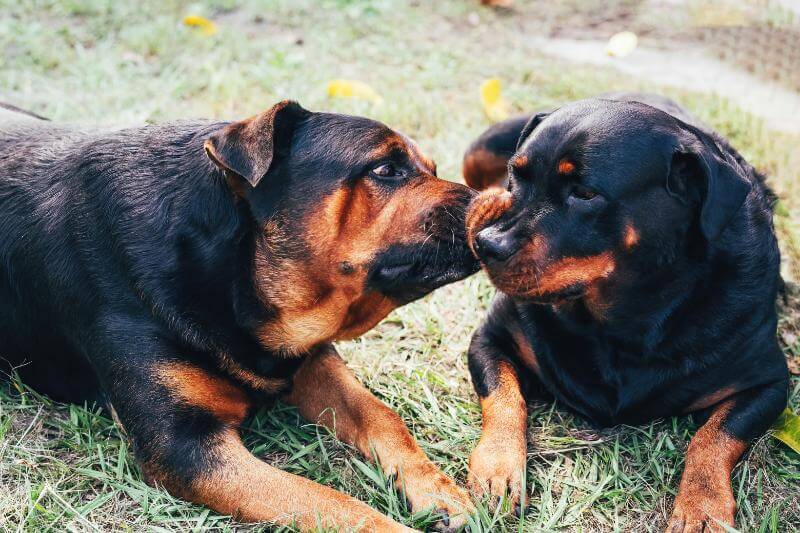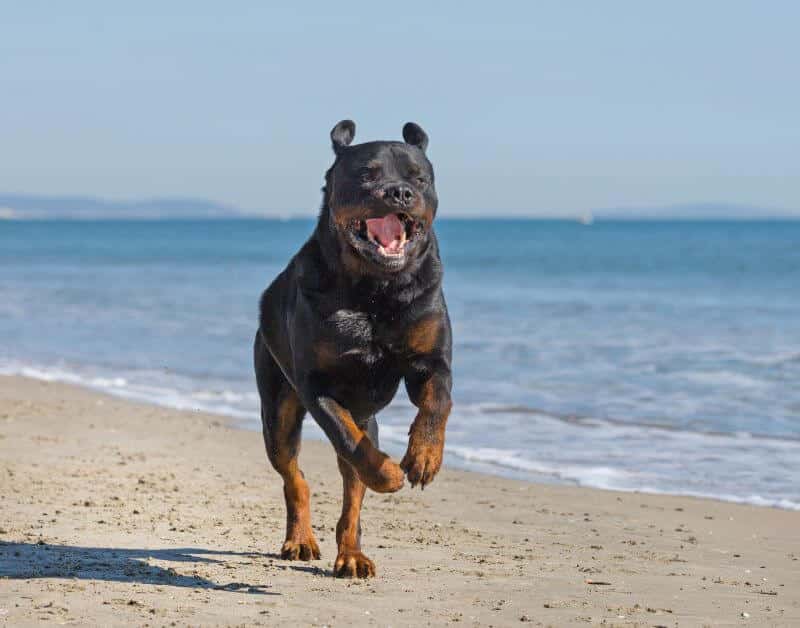At first glance, this topic may seem obvious. If you have a better dog, you can win more, right? But there are many elements that influence how the quality of your dog affects your win rate.
We’re going to look at how your win rate is affected if you have a good dog, if you have an excellent dog, and even if you have a marginal quality dog. I work with a fair number of owner handlers who have a range in the quality of their dogs.
Their success comes down to three issues:
- The ability of the handler to present the dog well;
- The competition
- The temperament of the dog.
These are the three factors we’ll be looking at in this article.

When You Have an Excellent Dog: Presentation
When your dog is outstanding, the first point to take into consideration, to elevate your win rate, is how well you present your dog. When you have an excellent quality dog—one that almost all experts agree is superb—you are at the top of your game. When you’re able to show your dog off with all his virtues in a professional presentation (no matter whether you are a professional or owner handler), you have the dog to beat. Period. If you’re not in the top standings, i.e., winning Breeds, Groups, and Bests, then you’re doing something wrong.
It takes an understanding of your breed and correct presentation to overcome the competition. I am talking about the breed-specific characteristics of your dog and of the competition. What is your breed’s history? What type of movement should your dog exhibit? It also takes continued authentic learning in the Sport.
Have you taken the time to read from the work of George Alston, Pat Craige Trotter, and Peter Green? Learn from these Masters of Presentation who have gone before you. Do you understand how to create a BluePrint* for your dog? Have you created an Action Plan* for your dog’s show schedule and advertising campaign? These are key actionable steps that will affect your win rate. If you don’t show the world how great your dog is, how will the judges know to point to him? Are you prepared to take your outstanding dog to the top of his game? That is the real question you have to ask yourself.
When You Have an Excellent Dog:
Your Competition
The second element to consider when you have a dog of excellent quality is your competition. There may be another outstanding dog in your geographic region that you bump up against on a regular basis. Remember, excellence isn’t just limited to your best beloved.
Some years, there are dogs in the Breed that are serious contenders; some years there are dogs in the Group that are fierce competition; and sometimes, most years, there are dogs in the Best in Show ring that are brutal competition.
I hear from owner handlers that they don’t understand why their beautiful dog doesn’t win more, or frankly, all the time. The answer is that THIS IS A COMPETITION! There are more good dogs out there than yours. No one just shows up and wins every time. You may have a quality dog, even an excellent quality dog, but yours may not be the only one that is exceptional.
Your Excellent Dog’s Temperament
“Give me an average dog with a great temperament over a great dog with an average temperament any day.” —Any Dog Show Person of Knowledge
That quote tells it all—whether your dog is above average or below average. A dog that is confident, has good energy, and that “likes himself” and shows the world just how much, creates the winning edge.
Your dog may have been born with a “show me” personality, or perhaps, you were clever enough to bring him up to be a show stopper. Either way, you are in a great position to rise to the top to overcome the competition.
I have often heard, “My dog is beautiful, but he doesn’t like showing.” As a judge, I can tell you that it’s easier to point to a happy dog rather than one that is bored with the whole process or sadly insecure. If your excellent dog doesn’t love showing, he will likely be beaten by one that does, and possibly even one of marginal quality. How do you fix this? Use your relationship network in dogs to help you find a solution or a mentor.
You’re not entitled to win anything. No matter the quality of your dog, he and you—the team—must earn it. These are key elements in how the quality of your dog affects your win rate. Are you prepared to take your excellent quality dog to the top of his game? This is the fundamental question.
When You Have a Good Dog: Preparation
How well you present your dog and the strategy that you develop is a key ingredient in increasing your win rate with a good dog. In fact, it’s even more important to create a stellar presentation* if your dog is not in the “Excellent” category and has observable faults.
Those faults may be in type or structure. Maybe his head isn’t quite right, or the topline is flawed or faulty in structure and movement. However, despite these shortcomings—when you have a good quality dog that most experts agree is virtuous, and you’re able to show that dog off with a professional presentation—your dog will do his fair share of winning.
In the good dog scenario, you do all of the same things as if you have an excellent dog in terms of practice, development, and strategy. You already know that handling class is not enough. You recognize that you don’t understand all of the strategies to help your dog win more in the ring, but you know how to find the help you need and are willing to do so.
Your primary focus is to study how the dog show game works and develop relationships in the Sport. Acquire and apply tools such as your FAV Five* so that when a better trained, superior dog comes along you’re ready to compete at the highest level.
When You Have a Good Dog: Competition
There will be better dogs that are more highly trained that knock your dog off his game and out of the running. With a good dog, you won’t go in the ring and automatically win, because most weekends your dog will be up against dogs of equal or better quality. If you’re not at the top of your game, winning Breeds and Groups will be difficult; Bests will elude your dog. Despite these limitations, there are things that you can do to improve your win rate.
Even the stellar dogs don’t just show up and win every time. Your competition will determine if your worthy dog wins. You may have a quality dog, even a very good quality dog, but I promise you that yours is not the only one.
It’s the same with doing the work! If you’re not doing the work required to knock off the competition, I guarantee you that someone else is! Once you’ve put in the time for your own preparation and strategy, your dog will be the one to beat—the dog that’s got the highest win rate. You’ve got to do the work. Persistence is key!
Your Good Dog’s Temperament
Remember the quote about an excellent dog’s temperament? That quote is even more apropos for the good dog in comparison to an excellent dog. You want your dog to sell himself to the judge, to tease the judge, so that s/he can’t wait to feel what’s under the coat.
If show dogs are “made, not born,” then get the training you need to make your dog happy—no matter what. Train the average dog so that he has a great temperament. I remember the first time that I heard the phrase, “show dogs are made, not born.” I thought, well, I can do that! And so, I went about reading and learning everything I could about the strategies for making a show dog.
The same goes for the phrase, when a dog “likes himself.” I think back to my experience years ago that started in the whelping box. A puppy that was merely three weeks old had stood up and waved to me. It was as if she was saying, “Pick me, pick me!” And so, I did. She was a rock star in the whelping box as much as she was in the ring. I loved her to the day she crossed the bridge. Some dogs are born with a “show me” personality. But even so, you will have had to be clever enough to bring him up to be a show dog.
When You Have a Marginal Dog: Competition
When I judge dog shows, I notice when exhibitors come into the ring with marginal quality dogs. What do I mean by “marginal quality?” I am referring to dogs that would not win if there were dogs present of average or better quality. If you are showing a marginal quality dog, your win rate will likely be quite low.
When I consider these dogs, I make every effort to be kind with my judgement and compassionate to the exhibitor. Despite this, I find myself saddened when exhibitors pay good money to get to the shows, often staying overnight to show again the next day, only to lose again and again.
Mostly, the marginal dogs are poorly presented; however, even if they were better trained, they would not be good examples of their breed. This is a perfect example of how an exhibitor can be well-prepared and still lose.
In rare cases, the handler is able to present the marginal dog well. In some even rarer cases, the marginal dog WINS! When this happens, the exhibitor, especially a new one, is encouraged to continue showing their dog—only to be disappointed later by judges who recognize the true quality of the dog.
When showing marginal dogs, your competition will be winning most of the time. Exhibitors who are showing dogs in this category are likely new to the Sport. They don’t recognize the difference between their dog and the dogs shown by more experienced exhibitors. Perhaps they are yet to fully understand their breed standard and are hoping for more clarity.
When You Have a Marginal Dog: Temperament
The temperament of the marginal dog is usually one of three personalities. The first is happy to be there for his person. They thrive on loving their person enough to tolerate being touched by strangers and running in left circles.
The second is the dog that is terrified to be in such a loud and smelly venue. They clearly don’t want to be there, but they find themselves with no options. It’s their person, after all.
The third way that I see a marginal dog in the ring is a dog that has been taught to show itself off as a show dog, but where the quality just can’t shine through because there is no real quality there. This may be the saddest of all because the exhibitor sees their dog as “showing like a million bucks,” which it is, but it’s not a “million bucks quality” dog. If only I, as a judge, could see those same exhibitors train quality dogs. Wow, now that would be fantastic!
There Is Always Room for Growth and Improvement!
So, we ask, who can win more? Can you win more with a better dog? The good news is that there are steps that you can take to improve your dog’s win rate whether he is excellent, good, or marginal. There is always room for growth and improvement!
Become a student of the Sport. Acknowledge where you are starting from and where you want to go. Be realistic with both your dog’s potential and your experience. As an owner handler, you can work on presentation. You can work on positioning yourself ideally against your competition. You can work on how you interact with your show dog to support him and bring out his confidence—and his resulting rock star temperament!
*Strategies of Dog Show Mentor










